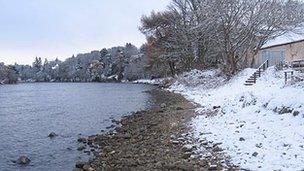'Hidden cost' to planned Inverness West Link road
- Published

The new West Link would have to cross the River Ness and Caledonian Canal
A BBC Scotland investigation has uncovered a potential hidden cost to a planned new bypass for Inverness.
Potential routes for the West Link would see it cross Whin Park and land nearby which Highland Council believes is in its ownership and free to use.
But BBC research of title deeds suggests that areas involved belong to the Inverness Common Good Fund, external.
Community land rights campaigner Andy Wightman said the fund would be due compensation if the land was built on.
Highland Council said the no land involved with the proposed road was in the ownership of the common good fund.
The West Link aims to take traffic from the city's Southern Distributor Road to the A82, avoiding the city centre.
Eight options proposed range in cost from £23m to £75.5m.
Most would impact on Whin Park, one of the city's busiest and most popular public spaces, and the land surrounding it.
The road would also have to cross the River Ness and Caledonian Canal.
One option, estimated to cost £67.8m, would involve the construction of a high-level bridge.
This option would avoid the park and would span both the river and canal.
Inverness provost Jimmy Gray said last week that the West Link was needed to divert traffic from city centre roads that were built for 19th Century transport.
Speaking at the launch of consultation on options for a new bypass, he said modern traffic was using streets designed for horses and carts.
John Laing, chairman of the council's technical services committee, hinted that the more expensive options would be beyond the local authority's budget.
He said £25m was available in the council's capital programme for the West Link.
Title deeds for the area surrounding Whin park appear to indicate that the land should be categorised as Inverness Common Good land.
It was part of the Bught Estate, which was bought in 1923 in the name of "the magistrates, provost and councillors of the Royal Burgh of Inverness" for the residents of the Highland capital.
However, Highland Council does not consider the land to form part of the city's common good assets.
The area contains the Inverness Leisure Centre, Inverness Ice Centre, Torvean golf club and sports pitches used by various clubs.
Rents gathered from these organisations are currently going directly into Highland Council's funds instead of the Inverness Common Good Fund account.
Money from the common good fund is used for community projects and makes payments to pensioners in the Inverness area who are struggling to pay winter heating bills.
Community land rights campaigner Andy Wightman wrote the book The Poor Had No Lawyers in which he highlighted the misuse of common good land across Scotland.
He told BBC Scotland: "Common good land can be rather difficult to pin down.
"But if a deed was granted in 1923 to the town council and it wasn't held by any special trusts for a museum or something like that and it wasn't acquired using any of the statutory powers that town councils had for sanitation or housing or roads, then it's quite clear to me that this is common good land."
Proper determination
Mr Wightman added: "Many councils deny that certain land and property is common good, which doesn't mean to say it isn't.
"Often their records are not very well kept they simply consult a register they have of common good assets and by saying it's not they merely mean it's not in the register.
"It's really only by examining the title and looking at the circumstances around the acquisition of the land or property that one can make a proper determination.
"I rather suspect that the circumstances of the acquisition of Bught Park have been lost in the mists of time as the town council moved on to the Inverness district council and now Highland region."
Mr Wightman believed that the common good land could have implications for the West Link and could mean that costs quoted by the Highland Council for the proposed routes could rise.
He said: "There are processes to be followed in terms of common good and it would almost certainly mean in my view that the Inverness Common Good Fund would be due compensation, probably set at a level determined by the district valuer, for the land that is no longer going to be used for the purposes for which is was acquired in the 1920s."
"It may mean that the council needs to go to the courts to get approval to construct any road."
- Published29 November 2011
- Published24 November 2011
- Published23 November 2011
- Published21 October 2011
- Published11 February 2011
- Published3 February 2011